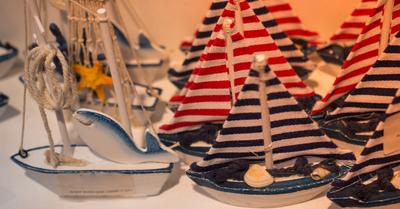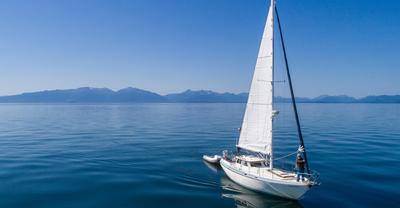Table of contents
How to Use Biodegradable Soaps to Protect Yourself from Polluting the Seas
In our quest for personal hygiene and cleanliness, we often overlook the environmental consequences of the products we use, particularly when it comes to soaps.
Conventional soaps, laden with synthetic chemicals and additives, can pose significant risks to marine ecosystems when washed down drains and into water bodies. However, there is a sustainable alternative: biodegradable soaps.
These environmentally friendly options are designed to break down harmlessly in the environment, minimizing their impact on marine life and water quality.
Let’s explore how to use biodegradable soaps effectively to protect yourself from polluting the seas.
Choose Biodegradable Options
Always opt for soaps labeled as 'biodegradable.' Look for words like eco-friendly, plant-based, or organic.
Good picks contain biodegradable ingredients like coconut oil or aloe vera and are free of synthetic preservatives.
Dr. Bronner's and Sea to Summit Wilderness Wash are top contenders for best biodegradable soaps.
Limit Usage Near Water Sources
Even biodegradable soaps can affect local water sources. If you're out and about in the great outdoors, wash at least 200 feet away from streams or lakes, to give the soap a chance to decompose before it reaches water bodies.
Proper Disposal
Just because it's eco-friendly doesn't mean it belongs in the river. Dispose of soapy water by scattering it on soil or vegetation, where the ground can act as a natural filter, breaking down the biodegradable compounds.
Use Suitable Containers
Say no to single-use plastics. Store your biodegradable soap in post-consumer recycled bottles or containers made from compostable materials.
Companies like Ursa Major offer innovative packaging solutions that support sustainability.
Minimize Impact
A little goes a long way with these concentrated soaps. Use only as much as needed to minimize waste and keep excess products out of the environment.
It’s not only economical but also environmentally responsible.
Avoid Harmful Additives
Ensure your soap is free from parabens, sulfates, phthalates, and other synthetic chemicals. These harsh additives can wreak havoc on marine life.
Go for pure, simple ingredients that are better for both you and the planet.
Follow Leave No Trace Principles
Embrace the ‘Leave No Trace’ ethos. Keep nature pristine by not introducing foreign substances. Remember, everything that comes with you should leave with you, including any packaging or residue.
Educate Others
Spread the word about the benefits of biodegradable soaps. Share your findings with friends and family to raise awareness about the impact of our cleaning products on the environment.
Support Eco-Friendly Brands
Back businesses that prioritize the planet. Brands like Mt. Mazama Rogue Soap not only produce sustainable products but also engage in environmental conservation efforts.
Lead by Example
Be the change by incorporating eco-friendly practices into your daily routine. When you actively choose sustainable options, you inspire others to consider their impact on the world's oceans and ecosystems.
How to Select Eco-Friendly Products That Are Safe for Marine Life
Selecting eco-friendly products that are safe for marine life is essential for minimizing our environmental footprint and protecting fragile aquatic ecosystems.
Here are some steps to help you make informed choices:
- Read Labels and Ingredients: Look for products labeled as "biodegradable," "reef-safe," or "ocean-friendly." Avoid products containing harmful chemicals such as oxybenzone, octinoxate, parabens, and triclosan, which can be toxic to marine life and coral reefs.
- Choose Natural and Plant-Based Ingredients: Opt for products made from natural and plant-based ingredients, as they are less likely to contain harmful chemicals and pollutants. Look for certifications such as USDA Organic or EcoCert to ensure the product meets strict environmental standards.
- Avoid Microbeads and Microplastics: Steer clear of products containing microbeads or microplastics, commonly found in exfoliating scrubs, toothpaste, and body washes. These tiny plastic particles can accumulate in waterways and harm marine life when ingested.
- Use Concentrated Formulas: Choose concentrated formulas or refillable packaging to minimize packaging waste and reduce your environmental impact. Concentrated products often require less packaging and transportation, resulting in fewer carbon emissions and less plastic pollution.
- Research Brands and Manufacturers: Investigate the environmental practices and sustainability initiatives of brands and manufacturers before making a purchase. Support companies committed to eco-friendly production methods, ethical sourcing, and responsible waste management.
- Consider Packaging Materials: Pay attention to the packaging materials used for eco-friendly products. Look for options made from recycled materials or biodegradable alternatives, and opt for minimal packaging whenever possible to reduce waste.
- Check for Biodegradability: Ensure that the product is biodegradable and breaks down safely in the environment. Biodegradable products decompose naturally over time, reducing the risk of pollution and harm to marine life.
The Environmental Impact of Traditional Soaps vs. Biodegradable Options
In recent years, growing awareness of environmental issues has prompted a shift towards more sustainable and eco-friendly consumer choices. One area of particular concern is the impact of personal care products, such as soaps, on the environment.
Traditional soaps, often laden with synthetic chemicals and additives, pose significant risks to aquatic ecosystems and water quality when washed down drains and into water bodies.
In contrast, biodegradable soap options have emerged as a promising alternative, designed to break down harmlessly in the environment without leaving behind harmful residues.
Here’s the environmental impact of traditional soaps versus biodegradable options:
Remember, choosing a biodegradable soap is like voting for the ocean with your washcloth. With each scrub, you're saying 'yes' to marine life and 'no' to unnecessary pollution.
The Role of Community-Based Soap Recycling Initiatives on our Seas
Community-based soap recycling initiatives have emerged as a powerful force in the ongoing battle to protect our seas and marine ecosystems.
As concerns about pollution and environmental degradation continue to mount, grassroots efforts to repurpose soap waste and minimize its impact on water bodies have gained momentum.
These initiatives not only address the pressing issue of soap pollution but also foster a sense of environmental stewardship and community engagement.
Let’s explore the significant role of community-based soap recycling initiatives in safeguarding our seas.
- Community-based soap recycling initiatives minimize soap waste entering water bodies, reducing pollution and protecting marine ecosystems.
- These grassroots efforts promote environmental stewardship and raise awareness about responsible soap disposal.
- By repurposing soap remnants and diverting them from landfills, these initiatives contribute to water quality preservation.
- Community engagement and education empower individuals and businesses to adopt sustainable soap disposal practices.
- These initiatives foster a sense of environmental responsibility and collective action within communities.
- They contribute to the circular economy by promoting resource efficiency and waste minimization.
- Through grassroots activism, volunteers mobilize for clean-up efforts and advocate for policy changes.
- Community-based soap recycling initiatives exemplify how local action can make a global impact on marine conservation efforts.
Frequently Asked Questions
Let's clear up some common queries people have about using biodegradable soaps.
Are there any specific guidelines or regulations for using biodegradable soaps in marine environments?
While the specifics can vary, a common recommendation is choosing soaps that break down quickly and completely in the environment. When out on the water or by the shore, look for soaps labeled as "marine-friendly" or "non-toxic to aquatic life."
Can biodegradable soaps be used safely in natural water bodies such as lakes, rivers, and oceans?
Yes, biodegradable soaps are designed to be used in natural water bodies as they break down into harmless components by natural processes. However, it's crucial to use them sparingly.
How should biodegradable soaps be disposed of to minimize their impact on marine ecosystems?
Use biodegradable soaps at least 200 feet away from natural water bodies, and dig a small hole in the soil to dispose of soapy water. This allows the soil to act as a filter, breaking down the soap before it can reach the water.











